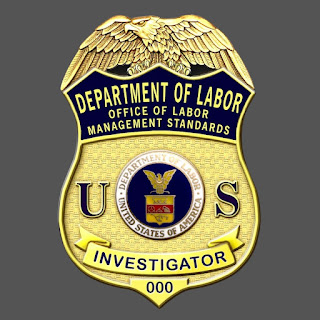Tuesday, October 3, 2023
The one thing your business can do right now to cut your potential FLSA liability in half
Q: What is the one thing that your business can do RIGHT NOW to cut your potential FLSA liability in half?
A: Hire an employment lawyer to conduct a wage and hour audit.
Case in point: Hendricks v. Total Quality Logistics.
After 13(!) years of litigation, a federal judge recently ruled that TQL violated the Fair Labor Standards Act and must pay unpaid overtime to thousands of misclassified employees.
The judge also ruled that TQL must pay statutory liquidated damages under the FLSA in an amount to the unpaid overtime because TQL did not establish that it acted in good faith in (mis)classifying its employees.
For more information, contact Jon at (440) 695-8044 or JHyman@Wickenslaw.com.
Do you like what you read? Receive updates two different ways:
Subscribe to the feed or register for free email updates.
Monday, October 2, 2023
How bad do wage and violations have to be for a federal judge to order you to sell your business? This bad.
A federal district court judge has ordered the owners and operators of 14 Subway restaurants to pay employees nearly $1 million in back wages and damages and further ordered them to sell or shut down their businesses within 60 days.
The wage and hour violations included:
For more information, contact Jon at (440) 695-8044 or JHyman@Wickenslaw.com.
Do you like what you read? Receive updates two different ways:
Subscribe to the feed or register for free email updates.
Tuesday, September 19, 2023
Let’s play FLSA error-spotting
Empire Diner pays its servers a tipped minimum wage of $2.83, the permissible tipped minimum wage in the state in which it's located, Pennsylvania. According to the company's payroll records, each employee earns more than the statutory minimum wage, $7.25 per hour.
For more information, contact Jon at (440) 695-8044 or JHyman@Wickenslaw.com.
Do you like what you read? Receive updates two different ways:
Subscribe to the feed or register for free email updates.
Wednesday, September 13, 2023
If you bet on which of your employees will get Covid, you probably shouldn’t qualify for a bonus
In late 2020, Tyson Foods fired seven of its pork processing plant managers after they were caught betting on which of their employees would next get sick with Covid. At that time, more than 1,000 Tyson employees had fallen ill, and six had died. In announcing the firings, the company's President and CEO said, "The behaviors exhibited by these individuals do not represent the Tyson core values, which is why we took immediate and appropriate action to get to the truth. Now that the investigation has concluded, we are taking action based on the findings."
Not content with leaving well enough alone, five of the seven fired managers sued Tyson Foods claiming that the company owed them a bonus payment pursuant to the company's Annual Incentive Plan.
For more information, contact Jon at (440) 695-8044 or JHyman@Wickenslaw.com.
Do you like what you read? Receive updates two different ways:
Subscribe to the feed or register for free email updates.
Thursday, August 31, 2023
DOL announced proposed rule to increase salary threshold for white-collar exempt employees
$1,059 per week. If the Department of Labor gets its wish, that amount will become the new salary threshold for its various white-collar overtime exemptions. Yesterday, the DOL published a notice of proposed rulemaking seeking to increase the FLSA's salary test from the current threshold of $684 per week ($35,568 annually) to $1,059 per week ($55,068 annually).
For more information, contact Jon at (440) 695-8044 or JHyman@Wickenslaw.com.
Do you like what you read? Receive updates two different ways:
Subscribe to the feed or register for free email updates.
Thursday, August 24, 2023
Determining the exempt status of a dual-purpose employee
Tony works at a local brewery as its assistant general manager. In that capacity, he interviews, hires, trains, coaches, disciplines, and fires lower-level employees; recommends employees for promotions; meets with lower-level managers to ensure they are meeting expectations; and reviews sales, hours, labor, and overtime reports. To meet the operational needs, however, Tony also picks up regular shifts in the taproom performing hourly, nonexempt work such as waiting tables and bartending. Despite his $75,000 annual salary, Tony estimates that he only spends approximately 20% of his working time performing his managerial duties, while he spends the balance of his time on non-exempt tasks.
Is Tony FLSA exempt or FLSA non-exempt?
For more information, contact Jon at (440) 695-8044 or JHyman@Wickenslaw.com.
Do you like what you read? Receive updates two different ways:
Subscribe to the feed or register for free email updates.
Wednesday, August 23, 2023
This is why I hate timeclock rounding policies
The rounding of an employee's clock-ins and clock-out to the nearest of a specific increment of time is perfectly legal. It's also a perfectly terrible idea.
For more information, contact Jon at (440) 695-8044 or JHyman@Wickenslaw.com.
Do you like what you read? Receive updates two different ways:
Subscribe to the feed or register for free email updates.
Wednesday, May 24, 2023
Pro tip: don’t monkey with an employee’s “regular” hourly rate to avoid overtime obligations
Let's say you have an employee who works 40 hours per week at the rate of $13.00 per hour. Now let's say that same employee needs to start working 20 hours of overtime per week to meet your needs. You still, however, want that employee to earn to same effective rate of $13.00 per week, so you reduce the employee's straight-time hourly rate of $11.15. When the need to work overtime ends, you then return the employee to the original $13.00 rate. Is the reduction of the employee's base hourly rate legal under the Fair Labor Standards Act?
According to the 11th Circuit in Thompson v. Regions Security Services, the answer is "not unless you want a jury to decide the legality of your pay practices under the FLSA."
For more information, contact Jon at (440) 695-8044 or JHyman@Wickenslaw.com.
Do you like what you read? Receive updates two different ways:
Subscribe to the feed or register for free email updates.
Monday, May 22, 2023
6th Circuit adopts one-step verification for FLSA collective actions
We hold that, for a district court to facilitate notice of an FLSA suit to other employees, the plaintiffs must show a "strong likelihood" that those employees are similarly situated to the plaintiffs themselves. That standard requires a showing greater than the one necessary to create a genuine issue of fact, but less than the one necessary to show a preponderance. The strong-likelihood standard is familiar to the district courts; it would confine the issuance of court-approved notice, to the extent practicable, to employees who are in fact similarly situated; and it would strike the same balance that courts have long struck in analogous circumstances.
With those words, the 6th Circuit ended decades of uncertainty in Fair Labor Standards Act wage and hour collective action lawsuits in my Circuit on the issue of when in such a lawsuit a district court should determine which employees properly belong in the the class.
For more information, contact Jon at (440) 695-8044 or JHyman@Wickenslaw.com.
Do you like what you read? Receive updates two different ways:
Subscribe to the feed or register for free email updates.
Thursday, May 18, 2023
A few wage and hour thoughts for beer festival season
As the weather warms up around the country and spring quickly transitions to summer, festival season will begin … including my personal favorite, the beer festival.
Beer festivals, however, raise a few specific wage and hour traps for participating breweries. Here's the 411.
For more information, contact Jon at (440) 695-8044 or JHyman@Wickenslaw.com.
Do you like what you read? Receive updates two different ways:
Subscribe to the feed or register for free email updates.
Tuesday, April 25, 2023
Tip credits, tip pools, and slutty vegans
Bar Vegan in an affiliate of Slutty Vegan, a plant-based restaurant chain that finds itself in the crosshairs of a wage-and-hour collective action lawsuit challenging how it pays its tipped employees. The issue focuses on the bar claiming a tip credit and paying its tipped bartenders less than the statutory minimum wage. That practice, in and of itself, is legal. What makes it allegedly illegal in this case, however, is how Bar Vegan distributes tips among its staff, and more specifically that it permits non-tipped employees to participate in a tip pool with its tipped bartenders.
That's an FLSA no-no.
For more information, contact Jon at (440) 695-8044 or JHyman@Wickenslaw.com.
Do you like what you read? Receive updates two different ways:
Subscribe to the feed or register for free email updates.
Tuesday, March 28, 2023
A tip on tipped workers: pay them correctly or else
The Department of Labor has sued the owner of two restaurants claiming that servers were not properly paid overtime.
For more information, contact Jon at (440) 695-8044 or JHyman@Wickenslaw.com.
Do you like what you read? Receive updates two different ways:
Subscribe to the feed or register for free email updates.
Tuesday, March 21, 2023
Federal court permits employer docking from an exempt employee’s PTO bank without violating the FLSA
I think it was Otis Redding who once famously sang, "I'm sittin' on the dock of the pay." 🤔
For more information, contact Jon at (440) 695-8044 or JHyman@Wickenslaw.com.
Do you like what you read? Receive updates two different ways:
Subscribe to the feed or register for free email updates.
Thursday, March 9, 2023
Relaxing child labor protections is not the solution to our labor problem
Ohio's Senate recently passed legislation that, if signed into law, would make it easier for businesses to employ 14- and 15-year-old children. SB 30 would amend Ohio's current child labor laws to permit 14- and 15-year-olds to work later than 7 pm during the school term with "approval to do so from the person's parent or legal guardian."
According to State Sen. Tim Shaffer, a Fairfield County Republican, he sponsored the bill to help solve Covid-related workforce shortages, in addition to teaching teens necessary work skills: "Learning how to show up on time, learning how to follow direction and execute commands and execute missions — I know at that age it was critically important for me. And this will certainly help employers across Ohio with their staffing problems as well."For more information, contact Jon at (440) 695-8044 or JHyman@Wickenslaw.com.
Do you like what you read? Receive updates two different ways:
Subscribe to the feed or register for free email updates.
Thursday, February 16, 2023
Do you know the rules for paying remote workers for “downtime”?
Every 10 minutes at some random point that she couldn't anticipate, the company took photos of her and her work, a screenshot of whatever she was working on, and a photo of her face. And they were doing that to verify whether or not she was working.… The company was using that to pay Carol and the other workers only for the minutes when they appeared active.
If she was clicking away at a spreadsheet, doing demonstrable work, she was fine. She would be paid for that 10-minute increment. But as soon as she got a cup of coffee or answered the doorbell or went to the bathroom, she risked not being paid for that time.…
[E]ven if she had worked for 9 and 1/2 minutes out of 10 minutes, if that screenshot showed her inactive, if she was gone or distracted for that 30 seconds, she wouldn't be paid for that increment.
The Department of Labor just issued a Field Assistance Bulletin reminding employers on the proper payment of remote workers under the Fair Labor Standards Act.
- The FLSA requires employers to pay nonexempt employees for all hours worked.
- "Hours worked" is not limited solely to time spent on active productive labor but also includes time spent waiting or on break.
- Short breaks of 20 minutes or less (e.g., to go to the bathroom, get a cup of coffee, let the dog outside, or stretch one's legs) are generally counted as compensable hours worked.
- Longer breaks "during which an employee is completely relieved from duty, and which are long enough to enable [the employee] to use the time effectively for [their] own purposes are not hours worked."
- These rules apply regardless of whether the work is performed at the employer's worksite, at the employee's home, or at some other location away from the employer's worksite.
In other words, even if you catch your nonexempt employees "not working" during the workday, if a break lasts 20 minutes or less you still must pay them. It's non-negotiable under the FLSA. (Exempt employees are paid a salary which becomes owed in full as soon as he or she works just one minute in a work week.)
If you discover an employee abusing paid breaks or their salary status, your remedy is discipline or termination, not withholding wages.
For more information, contact Jon at (440) 695-8044 or JHyman@Wickenslaw.com.
Do you like what you read? Receive updates two different ways:
Subscribe to the feed or register for free email updates.
Monday, February 6, 2023
The problem isn’t “fake” managers, it’s the poorly named “administrative” exemption
"Would you rather be a front-desk clerk or 'Director of First Impressions'? A barber or a 'Grooming Manager'?" CBS News posed this question, and concluded that employers use these fancy, inflated titles to avoid paying employees in full for their overtime work.
For more information, contact Jon at (440) 695-8044 or JHyman@Wickenslaw.com.
Do you like what you read? Receive updates two different ways:
Subscribe to the feed or register for free email updates.
Monday, January 23, 2023
The BIG risk of misclassifying employees as independent contractors
A national auto parts distributor has reached a settlement with the Department of Labor to pay a total of $5.6 million in back pay and liquidated damages (plus interest) to 1,398 drivers misclassified as independent contractors. The payments to the individual drivers are as low as $40 and as high as more than $120,000.
For more information, contact Jon at (440) 695-8044 or JHyman@Wickenslaw.com.
Do you like what you read? Receive updates two different ways:
Subscribe to the feed or register for free email updates.
Tuesday, January 10, 2023
Settlement highlights wage and hour risks of remote work
The City of Cleveland has agreed to pay $50,000 to settle the wage and hour claim of a City Hall employee who claimed that she wasn't paid overtime while working from home during the Covid-19 pandemic.
Eve Bonvissuto, an assistant administrator in the city's public safety department's medical unit, had claimed $68,709 in overtime pay. She alleged that the city had misclassified her as exempt, and that city had no timecard or time-tracking system in place at the time for remote workers.
For more information, contact Jon at (440) 695-8044 or JHyman@Wickenslaw.com.
Do you like what you read? Receive updates two different ways:
Subscribe to the feed or register for free email updates.
Tuesday, December 20, 2022
Avoiding liability missteps with year-end bonuses
As employers plan for year-end bonus payments to employees, you need to learn the difference between nondiscretionary bonuses, discretionary bonuses, and special occasion bonuses (such as holiday or other gifts). Otherwise, you risk finding a Department of Labor lump of coal in your wage and hour stocking.
For more information, contact Jon at (440) 695-8044 or JHyman@Wickenslaw.com.
Do you like what you read? Receive updates two different ways:
Subscribe to the feed or register for free email updates.
Wednesday, December 7, 2022
What should you do when the DOL shows up at your door?
"I'm an investigator with the Wage and Hour Division of the Department of Labor. I'm here to conduct an investigation into how your pay your employees." He then shows you his badge, and asks to see the following:
Records showing the business's annual dollar volume of transactions in in interstate commerce to establish that the DOL has jurisdiction; and
Payroll and time records for the past three years.
With that, you're off the races in a DOL wage and hour investigation. The investigator will seek to determine if you've properly classified your employees as exempt or non-exempt, and if you've met your minimum wage and overtime obligations.
What do you do now?
For more information, contact Jon at (440) 695-8044 or JHyman@Wickenslaw.com.
Do you like what you read? Receive updates two different ways:
Subscribe to the feed or register for free email updates.




















